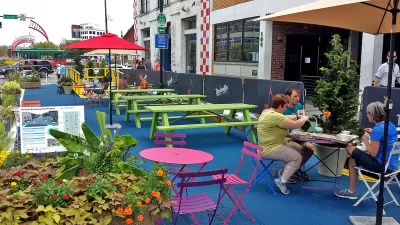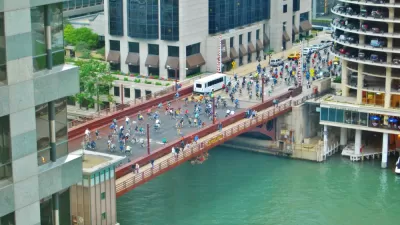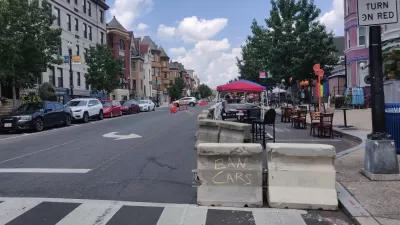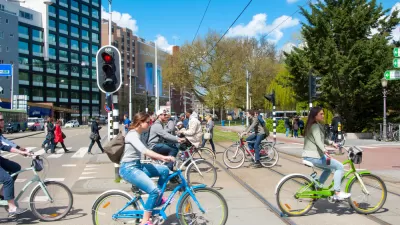In many cities, the public realm saw a drastic shift towards pedestrian-oriented infrastructure. The L.A. Times editorial board argues we should keep it that way.

"Let's keep the 'slow streets'" and other pandemic-induced infrastructure that cities implemented in the last year, says the Los Angeles Times editorial board.
"One of the bright spots of the last year has been cities’ willingness to swiftly transform the public realm into open-air spaces that can be used by people to safely gather, exercise and dine with social distancing." Now, it will take more political will to keep the beneficial changes. Maintaining the changes will require "consistent public funding for maintenance and ongoing community engagement and partnership in order to make them successful."
"Sure, it was a pretty easy decision to cordon off some streets and parking spaces in the first months of the pandemic, when many businesses were shuttered, commercial districts looked like ghost towns and people were stuck at home, trying to flatten the curve. But now, as life returns to some semblance of normality with traffic and commerce on the rise, too many cities are planning to revert to the old car-centric way of managing public spaces."
A Boston University survey of 130 mayors showed that few of them intended to make the changes in their city permanent, despite indications that more people will continue to walk and bike after the pandemic.
"Even before the pandemic, there was a growing recognition that public spaces are too oriented toward cars, and that’s created a vicious cycle. It hurts the quality of life in neighborhoods by making residents feel unsafe and uninspired to walk, bicycle or take transit. It discourages people from getting out of their cars, which makes it harder to cut the greenhouse gas emissions responsible for climate change."
We would be missing a huge opportunity by ignoring the possibilities that pandemic streets opened up, the editorial argues. "Let’s not roll back progress toward safer, healthier cities."
FULL STORY: After the pandemic, outdoor dining and ‘slow streets’ should live on

Alabama: Trump Terminates Settlements for Black Communities Harmed By Raw Sewage
Trump deemed the landmark civil rights agreement “illegal DEI and environmental justice policy.”

Study: Maui’s Plan to Convert Vacation Rentals to Long-Term Housing Could Cause Nearly $1 Billion Economic Loss
The plan would reduce visitor accommodation by 25% resulting in 1,900 jobs lost.

Planetizen Federal Action Tracker
A weekly monitor of how Trump’s orders and actions are impacting planners and planning in America.

Wind Energy on the Rise Despite Federal Policy Reversal
The Trump administration is revoking federal support for renewable energy, but demand for new projects continues unabated.

Passengers Flock to Caltrain After Electrification
The new electric trains are running faster and more reliably, leading to strong ridership growth on the Bay Area rail system.

Texas Churches Rally Behind ‘Yes in God’s Back Yard’ Legislation
Religious leaders want the state to reduce zoning regulations to streamline leasing church-owned land to housing developers.
Urban Design for Planners 1: Software Tools
This six-course series explores essential urban design concepts using open source software and equips planners with the tools they need to participate fully in the urban design process.
Planning for Universal Design
Learn the tools for implementing Universal Design in planning regulations.
Caltrans
Smith Gee Studio
Institute for Housing and Urban Development Studies (IHS)
City of Grandview
Harvard GSD Executive Education
Toledo-Lucas County Plan Commissions
Salt Lake City
NYU Wagner Graduate School of Public Service





























